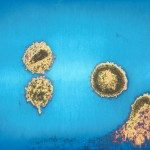Link to Pubmed [PMID] – 12824779
AIDS 2003 Jul; 17(10): 1425-34
To identify mechanisms of resistance to HIV-1 infection in exposed uninfected individuals.We examined in-vitro cell susceptibility to HIV-1 infection in highly exposed Vietnamese intravascular drug users (IDU) who, despite a history of more than 10 years of drug use and a high prevalence of other blood-borne viral infections, remain apparently HIV uninfected.Forty-five exposed uninfected IDU and 50 blood donors were included in the study. Peripheral blood mononuclear cells (PBMC) or CD4 cell susceptibilities to HIV infection were evaluated using three HIV-1 isolates with different tropisms. Polymerase chain reaction analysis of HIV-1-DNA replication intermediates was used to characterize the restriction of HIV-1 replication in CD4 cells. Homologous CD8 cells were mixed with infected CD4 cells to evaluate their role in virus suppression.We observed a relative resistance to PBMC infection with HIV-1 in 21 out of 45 exposed uninfected IDU, but only in five out of 50 unexposed controls (P < 0.001). PBMC resistance was related either to an inhibition of HIV-1 replication in CD4 cells or to CD8 cell-mediated viral suppression. HIV-1 replication in CD4 cells was restricted at the early stages of the viral cycle.Reduced PBMC susceptibility to HIV-1 infection was associated with resistance to infection in exposed uninfected IDU. Distinct mechanisms are involved in in-vitro resistance and may contribute to the apparent protection from HIV-1 transmission in this systemically exposed population.





